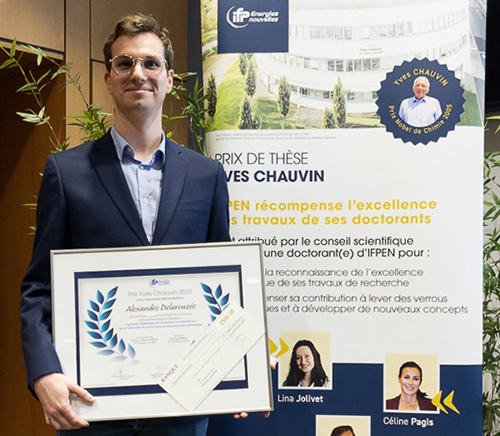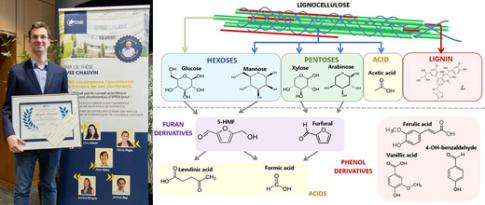24.11.2023
3 minutes of reading
Alexandre Delarouzée, winner of the 2023 Yves Chauvin prize, received his award at the ceremony held at IFPEN’s Rueil-Malmaison site on 23 November. His research focuses on optimizing the performance of Clostridium acetobutylicum bacterium. These bacteria are of potential value for biobased chemistry due to their capacity to produce chemicals of interest, such as acetone, n-butanol and isopropanol, via the fermentation of sugars extracted from lignocellulosic biomass.

Can you tell us a little about your background?
I began by studying biology at a technological university institute before going on to complete a program in biological engineering at the University of Technology of Compiègne (UTC). I’ve always been drawn to biotech, probably because I’m fascinated by the mechanisms governing living organisms and the intellectual puzzle they represent. Having spent one year at IFPEN as an engineer, I decided to continue my academic career with a doctoral thesis in the form of this applied research project carried out within the Institute during my PhD thesis.
What was the objective of your research?
My thesis related to the genetic study of Clostridium acetobutylicum bacterium. These bacteria, known for their solvent-producing capabilities, were used on an industrial scale at the start of the 20th century due to their capacity to produce acetone and n-butanol via fermentation. That process gradually fell into disuse in the 50’s with the development of the petrochemicals sector, but today’s ecological context and the advent of biotech have put these bacteria center stage once again. The aim of my thesis was to acquire new knowledge on the genetics of these bacteria, in order to optimize their performance for the fermentation of lignocellulosic biomass, such as wheat straw. The research addressed two major challenges: firstly, to enable the bacteria to effectively consume the hexose and pentose mixtures typical of lignocellulosic biomass and, secondly, to make the bacteria more resistant to the toxicity of certain compounds produced during lignocellulosic biomass pre-treatment.
What were the main outcomes of the research and for what applications?
The first aspect of my thesis identified new genetic regulation mechanisms, thanks to which C. acetobutylicum bacterium are able to prioritize the sugars they assimilate. The research required the creation of mutants of the microorganism, in which these mechanisms were absent, and observation of the way these mutants behaved in comparison with “wild” bacteria, on a fermentation and transcriptomic scale.
The second part consisted in achieving an accelerated and directed evolution of a population of C. acetobutylicum bacteria in order to gradually adapt it to the toxicity of a wheat straw lignocellulosic biomass. Analysis of the genetic changes selected by the laws of evolution in order to adapt to the changes we imposed is still ongoing, but it is sure to provide valuable information on the genes involved in this newly acquired resistance by evolved bacteria.
Both aspects of this research raise hopes for concrete applications for the design of an industrial C. acetobutylicum strain, genetically optimized to be more efficient in the fermentation of lignocellullosic biomass and the production of biobased solvents.
In parallel with this research with a short-term application, a third aspect was aimed at obtaining fundamental data relating to the genetic organization of C. acetobutylicum. In any organism, many genes are accessory and only serve a purpose in specific conditions. In contrast, a limited number of genes are considered to be “essential” since they contribute to the basic processes of life (cell replication, energy production, etc.). This aspect of my thesis consisted in simultaneously identifying all of the genes essential to the survival of C. acetobutylicum bacteria, via experimental biotech approaches. These data are vital and will guide our future reflections on the genetic optimization of this organism of industrial interest.
What are you doing now?
I’m still with IFPEN, and I keep working on the genetics of Clostridium acetobutylicum bacterium, while also considering other applications and projects. There are numerous problems surrounding the process development for biobased chemistry, and tackling these issues enables me to broaden my knowledge and make an active contribution to the energy transition.
How do you feel about the environment in which you conducted your thesis?
My thesis was a very rewarding experience. As a doctoral student, you are an integral part of the IFPEN environment, where the focus is on creating ideal conditions for scientific and professional development. Moreover, you benefit from the expertise of IFPEN’s research staff. Personally, I’ve had numerous opportunities to discuss my work with scientific experts and feed off the ideas that emerged from these exchanges.
You may also be interested in
Yves Chauvin Prize: Metabolic engineering at the heart of bio-based processes
Within the context of the energy transition, new bioprocesses are emerging as substitutes for processes using fossil resources. For example, Clostridium acetobutylicum is a microorganism capable of converting the large variety of sugars derived from lignocellulosic biomass into a raft of bio-based substances, via fermentation. This makes it a potential candidate for producing biofuels and/or chemical intermediates that can be used by industry....






